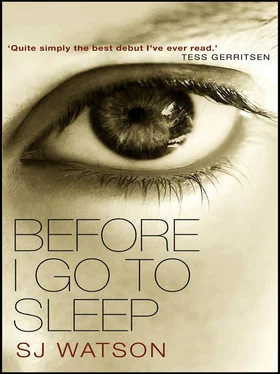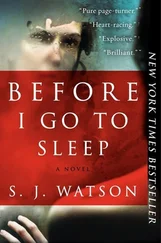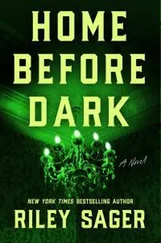S. Watson - Before I Go to Sleep - A Novel
Здесь есть возможность читать онлайн «S. Watson - Before I Go to Sleep - A Novel» весь текст электронной книги совершенно бесплатно (целиком полную версию без сокращений). В некоторых случаях можно слушать аудио, скачать через торрент в формате fb2 и присутствует краткое содержание. Год выпуска: 2011, Жанр: Триллер, на английском языке. Описание произведения, (предисловие) а так же отзывы посетителей доступны на портале библиотеки ЛибКат.
- Название:Before I Go to Sleep: A Novel
- Автор:
- Жанр:
- Год:2011
- ISBN:нет данных
- Рейтинг книги:3 / 5. Голосов: 1
-
Избранное:Добавить в избранное
- Отзывы:
-
Ваша оценка:
- 60
- 1
- 2
- 3
- 4
- 5
Before I Go to Sleep: A Novel: краткое содержание, описание и аннотация
Предлагаем к чтению аннотацию, описание, краткое содержание или предисловие (зависит от того, что написал сам автор книги «Before I Go to Sleep: A Novel»). Если вы не нашли необходимую информацию о книге — напишите в комментариях, мы постараемся отыскать её.
Before I Go to Sleep: A Novel — читать онлайн бесплатно полную книгу (весь текст) целиком
Ниже представлен текст книги, разбитый по страницам. Система сохранения места последней прочитанной страницы, позволяет с удобством читать онлайн бесплатно книгу «Before I Go to Sleep: A Novel», без необходимости каждый раз заново искать на чём Вы остановились. Поставьте закладку, и сможете в любой момент перейти на страницу, на которой закончили чтение.
Интервал:
Закладка:
I closed my eyes. I saw nothing but a card on a pillow upon which I see the words I love you . I shook my head.
‘You recovered, but your memory didn’t improve. You stayed in the hospital for a couple of weeks. In the intensive care unit at first and then the general ward. When you were well enough to be moved you were transported back to London.’
Back to London. Of course. I was found near a hotel; I must have been away from home. I asked where it was.
‘In Brighton,’ he said. ‘Do you have any idea why you might have been there? Any connection to that area?’
I tried to think of holidays, but nothing came.
‘No,’ I said. ‘None. None that I know of, anyway.’
‘It might help to go there, at some point. To see if you remember.’
I felt myself go cold. I shook my head.
He nodded. ‘OK. Well, there could be any number of reasons why you’d be there, of course.’
Yes, I thought. But only one that incorporated flickering candles and bunches of roses but didn’t include my husband.
‘Yes,’ I said. ‘Of course.’ I wondered if either of us was going to mention the word affair , and how Ben must have felt when he realized where I had been, and why.
It struck me then. The reason Ben had not given me the real explanation for my amnesia. Why would he want to remind me that once, however briefly, I had chosen another man over him? I felt a chill. I had chosen someone over my husband, and look at the price I had paid.
‘What happened then?’ I said. ‘Did I move back in with Ben?’
He shook his head. ‘No, no,’ he said. ‘You were still very ill. You had to stay in the hospital.’
‘For how long?’
‘You were in the general ward at first. For a few months.’
‘And then?’
‘You were moved.’ He hesitated — I thought I would have to ask him to continue — and then said, ‘To a psychiatric ward.’
The word shook me. ‘A psychiatric ward?’ I imagined a fearful place, full of crazy people, howling, deranged. I could not see myself there.
‘Yes.’
‘But why? Why there?’
He spoke softly, but his tone betrayed annoyance. I felt suddenly convinced we had been through all this before, perhaps many times, presumably before I had begun to keep my journal. ‘It was more secure,’ he said. ‘You had made a reasonable recovery from your physical injuries by now, but your memory problems were at their worst. You didn’t know who you were, or where. You were exhibiting symptoms of paranoia, claiming the doctors were conspiring against you. You kept trying to escape.’ He waited. ‘You were becoming increasingly unmanageable. You were moved for your own safety, as well as the safety of others.’
‘Of others?’
‘You occasionally lashed out.’
I tried to imagine what it must have been like. I pictured someone waking up every day, confused, not sure who they were, or where, or why they’d been put in hospital. Asking for answers, and not getting them. Being surrounded by people who knew more about them than they did. It must have been hell.
I remembered that we were talking about me.
‘And then?’
He didn’t answer. I saw his eyes go up and he looked past me, towards the door, as if he were watching it, waiting. But there was no one there, it did not open, no one left or came in. I wondered if he was actually dreaming of escape.
‘Dr Nash,’ I said, ‘what happened then?’
‘You stayed there for a while,’ he said. His voice was almost a whisper now. He has told me this before, I thought, but this time he knows I will write it down and carry it with me for more than a few hours.
‘How long?’
He said nothing. I asked him again. ‘How long?’
He looked up at me, his face a mixture of sadness and pain. ‘Seven years.’
He paid, and we left the coffee shop. I felt numb. I don’t know what I was expecting, where I thought I had lived out the worst of my illness, but I didn’t think it would be there. Not in the middle of all that pain.
As we walked, Dr Nash turned to me. ‘Christine,’ he said, ‘I have a suggestion.’ I noticed how casually he spoke, as if he was asking which flavour of ice cream I would prefer. A casualness that can only be affected.
‘Go on,’ I said.
‘I think it might be helpful for you to visit the ward where you were admitted,’ he said. ‘The place you spent all that time.’
My reaction was instant. Automatic. ‘No!’ I said. ‘Why?’
‘You’re experiencing memory,’ he said. ‘Think of what happened when we went to visit your old house.’ I nodded. ‘You remembered something then. I think it might happen again. We might trigger more.’
‘But—’
‘You don’t have to. But … look. I’ll be honest. I’ve already made the arrangements with them. They’d be happy to welcome you. Us. Any time. I only have to ring to let them know we’re on our way. I’d come with you. If you felt distressed or uncomfortable we could leave. It’ll be fine. I promise.’
‘You think it might help me to get better? Really?’
‘I don’t know,’ he said. ‘But it might.’
‘When? When do you want to go?’
He stopped walking. I realized the car we were standing next to must be his.
‘Today,’ he said. ‘I think we should go today.’ And then he said something odd. ‘We don’t have time to lose.’

I didn’t have to go. Dr Nash didn’t force me to agree to the trip. But, though I can’t remember doing so — can’t remember much at all, in fact — I must have said yes.
The journey was not long, and we were silent. I could think of nothing. Nothing to say, nothing to feel. My mind was empty. Scooped out. I took my journal out of my bag — not caring that I had told Dr Nash I didn’t have it with me — and wrote that last entry in it. I wanted to record every detail of our conversation. I did it, silently, almost without thinking, and we didn’t speak as he parked the car, nor as we walked through the antiseptic corridors with their smell of stale coffee and fresh paint. People were wheeled past us on trolleys, attached to drips. Posters peeled off the walls. Overhead lights flickered and buzzed. I could think only of the seven years I had spent there. It felt like a lifetime; one I remembered nothing of.
We came to a stop outside a double door. Fisher Ward. Dr Nash pressed a button on an intercom mounted on the wall then mumbled something into it. He is wrong, I thought as the door swung open. I did not survive that attack. The Christine Lucas who opened that hotel-room door is dead.
Another double door. ‘You OK, Christine?’ he said as the first closed behind us, sealing us in. I said nothing. ‘This is a secure unit.’ I was hit with a sudden conviction that the door behind me was closing for ever, that I would not be leaving.
I swallowed. ‘I see,’ I said. The inner door began to open. I didn’t know what I would see beyond it, couldn’t believe I had ever been here before.
‘Ready?’ he said.
A long corridor. There were doors off each side and as we walked I could see that they opened into glass-windowed rooms. In each was a bed, some made, some unmade, some occupied, most not. ‘The patients here suffer from a variety of problems,’ said Dr Nash. ‘Many show schizoaffective symptoms, but there are those with bipolarity, acute anxiety, depression.’
I looked in one window. A girl was sitting on the bed, naked, staring at the television. In another a man sat on his haunches, rocking, his arms wrapped around his knees as if to shield himself from the cold.
‘Are they locked in?’ I said.
‘The patients here have been detained under the Mental Health Act. Also known as sectioning. They’re here for their own good, but against their wishes.’
Читать дальшеИнтервал:
Закладка:
Похожие книги на «Before I Go to Sleep: A Novel»
Представляем Вашему вниманию похожие книги на «Before I Go to Sleep: A Novel» списком для выбора. Мы отобрали схожую по названию и смыслу литературу в надежде предоставить читателям больше вариантов отыскать новые, интересные, ещё непрочитанные произведения.
Обсуждение, отзывы о книге «Before I Go to Sleep: A Novel» и просто собственные мнения читателей. Оставьте ваши комментарии, напишите, что Вы думаете о произведении, его смысле или главных героях. Укажите что конкретно понравилось, а что нет, и почему Вы так считаете.












